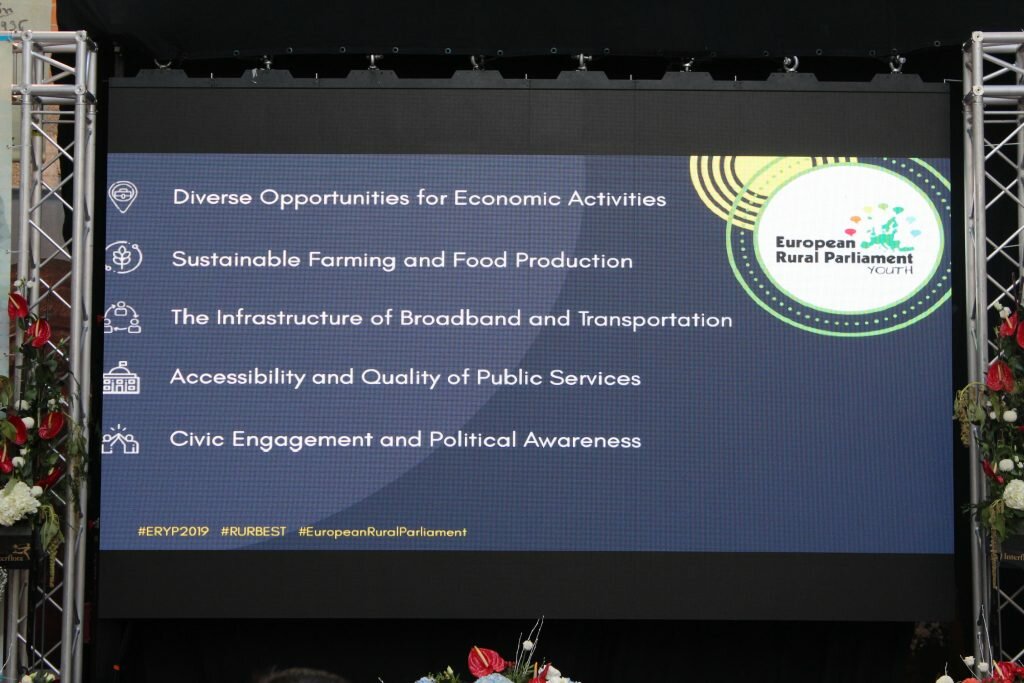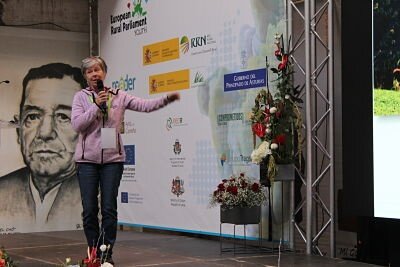Young Europeans made their needs and interests clear during the second European Rural Youth Parliament (ERYP) in Candás between 4 and 6 November, and that is that they have their own voice, they want to be heard and nobody speaks for them. They have identified their demands very well and thus want to transfer it to the instances that determine policies, from the local to the European, beyond the EU itself (not in vain did countries that are not part of it participate), passing through the regional and national, from the political to the civil, involving the whole of society.
Three days of intense work in which a multitude of synergies were created, experiences were shared and a voice was given to the latent needs of young people to stay in rural areas, to make them attractive to other young people and to develop a future beyond the most traditional understood in relation to the countryside, such as livestock and agriculture.
A total of 70 participants from 15 countries, with a large presence from Eastern Europe and the Balkans, worked with group dynamics, presenting the experiences brought from each of their territories and identifying different needs according to this diversity. A delegation of 18 young representatives from each country subsequently participated in the fourth European Rural Parliament in order to transfer their conclusions to this and its final Declaration, which will be forwarded to Brussels, as well as to the different local, regional and national governments.
Not in vain has the celebration of both parliaments marked a milestone, not only for the high participation, but for being the first time that both meetings are held consecutively in time, sharing the same space.
Five lines of work
Prior to the celebration of ERYP, the participating European youth had already identified the five star themes to work on these days:

![]() Diverse opportunities for economic activities
Diverse opportunities for economic activities
![]() Sustainable food and agriculture system
Sustainable food and agriculture system
![]() Infrastructural and digital connectivity
Infrastructural and digital connectivity
![]() Accessibility and quality of public services
Accessibility and quality of public services
![]() Civic engagement and political awareness
Civic engagement and political awareness
Around them, they specified their demands which, to a large extent, require good communications to enable the creation of new businesses or teleworking, without losing sight of sustainability, the quality of public services, including education, and the awareness and social commitment of the inhabitants of the environment. And it is that despite the diversities, there are common denominators that are repeated all over Europe and from which sometimes the political agenda is a bit far away, as they pointed out. Hence their intention to create a “real rural agenda” born from the bottom up.
Exchange of experiences
The program coordinated from Latvian Rural Forum with the collaboration of the Asturian Network of Rural Development (READER), host of the Parliaments, contemplated the celebration of debates with different experts, focused on the challenges of the rural and the responses that are being received through the different institutions and civic initiatives.
In this round of exhibitions Veronika Korčeková, from the European Network for Rural Development (ENRD); Simone Matouch from Forum Synergies, who presented the book ‘Rural Europe on the move’ which gathers different rural development projects; the researcher from the University of Oviedo Raúl Carbajal López part of the study in which he is working ‘Analysis of the Asturian agrarian reality (1950-1980) and constructive proposals from/for rural youth. Challenges and opportunities for a modern and updated post-industrial model’; David Sanjuán presented the international organization in which the Erasmus Student Network (ESN) collaborates, whose main objective is to promote activities for cultural understanding and personal self-development under the principle that students help students, establishing relationships between different levels of education to publicize the principles of the Erasmus scholarship; Mateo Metta is a young expert in the evaluation of the EU Rural Development Policy, who explained what his work consists of; finally Helene Schulze, from the Agricultural and Rural Convention 2020 (ARC2020) focused on sustainable food production, field of action of the entity in which he participates. The moderator of the table was Katrīna Idū, from Latvian Rural Forum.
Jakub Dvorský, member of the Slovak Rural Parliament (VIPA SK), was in charge of presenting the results of a survey carried out a few days before among ERYP participants.
Valnalón, an Asturian entity that promotes entrepreneurship, presented its programme Valnalón Educa under the title ‘Promotion of entrepreneurial culture in the educational system’, by Amara Hinojal and Javier Vallina, who explained the different projects they develop at various educational levels in the educational centres of Asturias.
All the ideas contributed and extracted, the shared experiences and proposals for improvement were taking shape until they became concrete in the Declaration of Rural Youth, which was subsequently incorporated into the Declaration of Candás presented at the closing of the European Rural Parliament and which in January will be presented to the European Parliament.
Entrepreneurial Initiatives
ERYP attendees also got to know in situ several entrepreneurial initiatives developed by young people in the area around Candás. Christopher Mitchell, also a volunteer in Parliament, presented the rural house El Fancornio Rural, which he runs together with his family, while David Rodríguez, who leads the Pepemilio livestock farm, had to answer a thousand and one questions about the milking robot he has in his facilities, which attracted a lot of attention, especially among participants from Bosnia-Herzegovina and Croatia. Iván Busto gave a master class on his plantation of organic kiwis, the only production certified in the council of Carreño by the Council of Ecological Agricultural Production (COPAE). The fifth generation llagarero (cider producer) Arturo González Cortés, from Sidra Peñón, closed the visits.
The program was also completed with a workshop of homemade bread and cider, as well as tasting of typical desserts marañueles, frixuelos and fried pumpkin with the collaboration of the Association of Rural Women Nosotr@s and the Association of Homemade Cider de Carreño. The musical note came from the hand of the rock group of the Municipal School of Music ‘Miguel Barrosa’ Carreño and the group version of the facts, which encouraged the dance.
The ten calls to action
Throughout the process of developing the Youth Parliament, the participants reached their own conclusions, which were reflected in a document containing the ten calls to action on the most urgent issues for European youth. These are the points considered by the participants as the challenges on which to act and which would make the rural world a more attractive environment that would offer better options both for those who decide to stay in it and to attract new settlers.
This document was later read in the third plenary that put an end to the European Rural Parliament, held in Candás between 6 and 9 November, in which a delegation of 18 young participants from the ERYP took part. These actions were taken into account and included in the Declaration of Candás and in the Manifesto that will be presented in January 2020 to the European institutions by a representation of attendees to both parliaments.
Dowload the ERYP_Declaration 2019 – EN
Image gallery of reading the calls to action of young people
Photo gallery of various moments of the European Rural Youth ParliamentThe European Rural Parliament (ERP) is a long-term campaign that expresses the voice of people in rural Europe and promotes self-help and action by rural people, in partnership with civil society and governments. The ERP Youth movement serves as a platform for young people to ENGAGE in the rural development process, to CONNECT organisations and professionals across Europe and to EMPOWER advocating their needs to multi-level stakeholders.



























